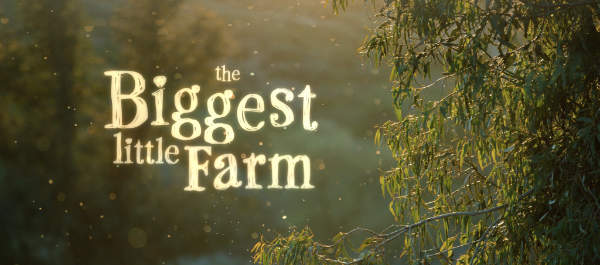There is no question that the documentary The Biggest Little Farm, directed by John Chester, which chronicles how he and Molly, his wife, rejuvenated 200 acres of lands in the foothills of Ventura County into a vibrant agricultural ecosystem is an outstanding story that captures every imaginable emotion and quickly wins over the hearts of its viewers.
However, Chester also takes an important cue in expanding the metaphysical considerations about the painful lessons they have learned in building Apricot Lane Farms since 2011. The film is screening at Sundance as part of the U.S. Documentary Film Competition.

If we want to achieve a new normal in sustaining our environment, we need to do more than talk about rejecting the misdirected perceptions about human dominion over nature. No doubt, Chester wisely chose the film’s exposition to be a charming engagement for viewers to begin to see what is possible. But, then Chester moves rightfully so into far more important – and certainly even more admirable territory – in the lesson that in order to renew the land one must insist on respecting and allowing the interdependency of all living things to flourish as well, especially in those instances of the early years that presented setbacks to challenge and confound their initial idealistic expectations.
Indeed, this is why Alan York, the consultant and mentor, looms so significantly in their lives. The first impression was awkward. York appears in a linen shirt and sandals. At the talkback after the screening, Chester recalls that York brought a case of wine when they met and his wife said they don’t drink wine. York had been advising some wineries about the biodynamic practices.
However, the Chesters quickly took to York’s passion and advice, which the mentor offered in the utmost simple, plainspoken language possible. But, York also spoke to an ethic that the Chesters picked up and have articulated quite beautifully in this gorgeous case study of a film. To renew the land means moving away and resisting the temptation of agricultural practices that put the idea of extracting as much yield as possible first before all other considerations – one that even many large organic farms are complicit in following to ensure their business model thrives.

York taught them the value of recycling biomass, nutrients and other natural biological processes where every species is treated as evolving in tandem rather than as discrete elements. In a short time the Chesters saw the positive impact of that advice but then, sadly, they had to continue as students without the benefit of York, who became seriously ill with an aggressive form of cancer and died.
There are many valuable discoveries in this film. Cover crops feed the soil off-season and save on costs associated with fertilizers and erosion. The compact presence of livestock, crops and fruit trees creates an interacting system that ultimately can bring the plentiful bounty of pests under control with the help of wildlife.
They discover that ducks happily gobble up the snails that infested their orchard trees. One of their biggest ethical dilemmas is dealing with ravenous coyotes who are decimating their poultry population. Their efforts have been acknowledged by the North American Butterfly Association as well as the National Wildlife Federation.
Biodynamic farming still has a long way to go before it gathers the legitimacy and credibility that will compel others to follow a similar path as the Chesters have achieved in their small bucolic paradise, supported magnificently by the film’s visual imagery, especially at a close-up view. But, farms that are following this philosophy are growing in numbers.
Unquestionably, animals are among the film’s most important stars who signify the story’s most consequential lessons. Todd is a rescue dog whose endless barking led them to being served with an eviction notice from their Los Angeles apartment, a move that motivated them to buy the land in Moorpark, California. Another is Emma, a pig, who becomes seriously ill after giving birth to an enormous litter. A picture book titled Saving Emma The Pig will be published in May, about a month after Neon’s distribution release of the film is set for the U.S.
Chester is an Emmy-award winning filmmaker. The film premiered last year at Telluride and screened as well at the Toronto International Film Festival. It won the audience award as best documentary feature at the Palm Springs International Film Festival.
Other screenings will be Jan. 29 at 5:30 p.m. in the MARC Theatre in Park City, Jan. 30 at Redstone Cinema in Park City and Feb. 2 at 6 p.m. in the Library Centre Theatre in Park City.

